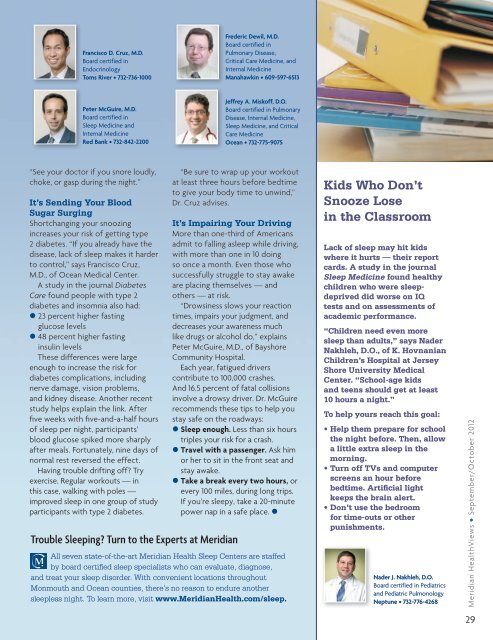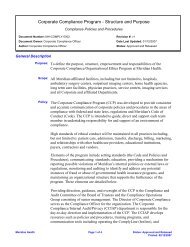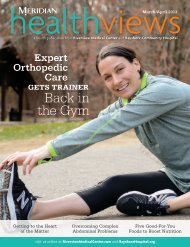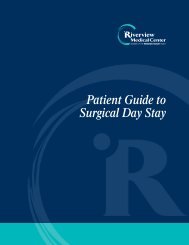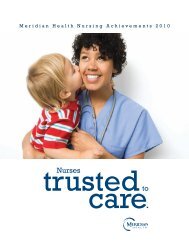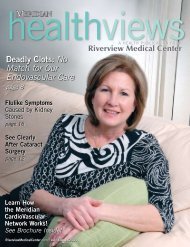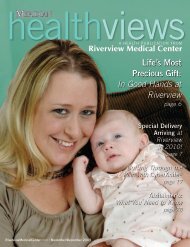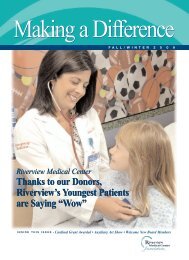Download the September/October 2012 Issue - Bayshore ...
Download the September/October 2012 Issue - Bayshore ...
Download the September/October 2012 Issue - Bayshore ...
Create successful ePaper yourself
Turn your PDF publications into a flip-book with our unique Google optimized e-Paper software.
Francisco D. Cruz, M.D.<br />
Board certified in<br />
Endocrinology<br />
Toms River • 732-736-1000<br />
Frederic Dewil, M.D.<br />
Board certified in<br />
Pulmonary Disease,<br />
Critical Care Medicine, and<br />
Internal Medicine<br />
Manahawkin • 609-597-6513<br />
Peter McGuire, M.D.<br />
Board certified in<br />
Sleep Medicine and<br />
Internal Medicine<br />
Red Bank • 732-842-2200<br />
Jeffrey A. Miskoff, D.O.<br />
Board certified in Pulmonary<br />
Disease, Internal Medicine,<br />
Sleep Medicine, and Critical<br />
Care Medicine<br />
Ocean • 732-775-9075<br />
“See your doctor if you snore loudly,<br />
choke, or gasp during <strong>the</strong> night.”<br />
It’s Sending Your Blood<br />
Sugar Surging<br />
Shortchanging your snoozing<br />
increases your risk of getting type<br />
2 diabetes. “If you already have <strong>the</strong><br />
disease, lack of sleep makes it harder<br />
to control,” says Francisco Cruz,<br />
M.D., of Ocean Medical Center.<br />
A study in <strong>the</strong> journal Diabetes<br />
Care found people with type 2<br />
diabetes and insomnia also had:<br />
• 23 percent higher fasting<br />
glucose levels<br />
• 48 percent higher fasting<br />
insulin levels<br />
These differences were large<br />
enough to increase <strong>the</strong> risk for<br />
diabetes complications, including<br />
nerve damage, vision problems,<br />
and kidney disease. Ano<strong>the</strong>r recent<br />
study helps explain <strong>the</strong> link. After<br />
five weeks with five-and-a-half hours<br />
of sleep per night, participants’<br />
blood glucose spiked more sharply<br />
after meals. Fortunately, nine days of<br />
normal rest reversed <strong>the</strong> effect.<br />
Having trouble drifting off? Try<br />
exercise. Regular workouts — in<br />
this case, walking with poles —<br />
improved sleep in one group of study<br />
participants with type 2 diabetes.<br />
“Be sure to wrap up your workout<br />
at least three hours before bedtime<br />
to give your body time to unwind,”<br />
Dr. Cruz advises.<br />
It’s Impairing Your Driving<br />
More than one-third of Americans<br />
admit to falling asleep while driving,<br />
with more than one in 10 doing<br />
so once a month. Even those who<br />
successfully struggle to stay awake<br />
are placing <strong>the</strong>mselves — and<br />
o<strong>the</strong>rs — at risk.<br />
“Drowsiness slows your reaction<br />
times, impairs your judgment, and<br />
decreases your awareness much<br />
like drugs or alcohol do,” explains<br />
Peter McGuire, M.D., of <strong>Bayshore</strong><br />
Community Hospital.<br />
Each year, fatigued drivers<br />
contribute to 100,000 crashes.<br />
And 16.5 percent of fatal collisions<br />
involve a drowsy driver. Dr. McGuire<br />
recommends <strong>the</strong>se tips to help you<br />
stay safe on <strong>the</strong> roadways:<br />
• Sleep enough. Less than six hours<br />
triples your risk for a crash.<br />
• Travel with a passenger. Ask him<br />
or her to sit in <strong>the</strong> front seat and<br />
stay awake.<br />
• Take a break every two hours, or<br />
every 100 miles, during long trips.<br />
If you’re sleepy, take a 20-minute<br />
power nap in a safe place. •<br />
Trouble Sleeping? Turn to <strong>the</strong> Experts at Meridian<br />
All seven state-of-<strong>the</strong>-art Meridian Health Sleep Centers are staffed<br />
by board certified sleep specialists who can evaluate, diagnose,<br />
and treat your sleep disorder. With convenient locations throughout<br />
Monmouth and Ocean counties, <strong>the</strong>re’s no reason to endure ano<strong>the</strong>r<br />
sleepless night. To learn more, visit www.MeridianHealth.com/sleep.<br />
Kids Who Don’t<br />
Snooze Lose<br />
in <strong>the</strong> Classroom<br />
Lack of sleep may hit kids<br />
where it hurts — <strong>the</strong>ir report<br />
cards. A study in <strong>the</strong> journal<br />
Sleep Medicine found healthy<br />
children who were sleepdeprived<br />
did worse on IQ<br />
tests and on assessments of<br />
academic performance.<br />
“Children need even more<br />
sleep than adults,” says Nader<br />
Nakhleh, D.O., of K. Hovnanian<br />
Children’s Hospital at Jersey<br />
Shore University Medical<br />
Center. “School-age kids<br />
and teens should get at least<br />
10 hours a night.”<br />
To help yours reach this goal:<br />
• Help <strong>the</strong>m prepare for school<br />
<strong>the</strong> night before. Then, allow<br />
a little extra sleep in <strong>the</strong><br />
morning.<br />
• Turn off TVs and computer<br />
screens an hour before<br />
bedtime. Artificial light<br />
keeps <strong>the</strong> brain alert.<br />
• Don’t use <strong>the</strong> bedroom<br />
for time-outs or o<strong>the</strong>r<br />
punishments.<br />
Nader J. Nakhleh, D.O.<br />
Board certified in Pediatrics<br />
and Pediatric Pulmonology<br />
Neptune • 732-776-4268<br />
Meridian HealthViews • <strong>September</strong>/<strong>October</strong> <strong>2012</strong><br />
29


